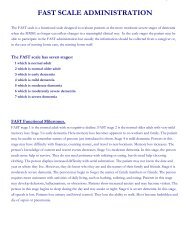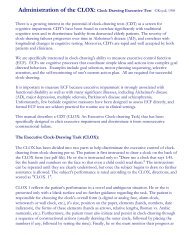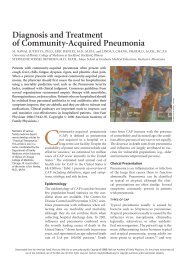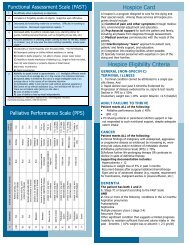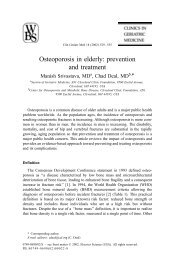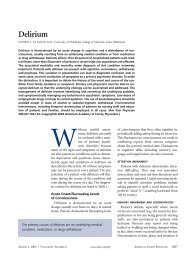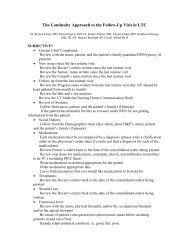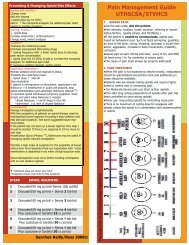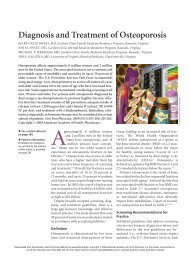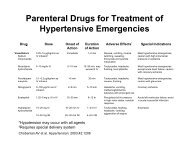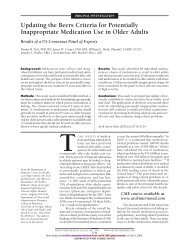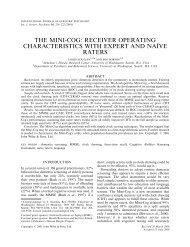Behavior Disorders of Dementia: Recognition and Treatment
Behavior Disorders of Dementia: Recognition and Treatment
Behavior Disorders of Dementia: Recognition and Treatment
- No tags were found...
Create successful ePaper yourself
Turn your PDF publications into a flip-book with our unique Google optimized e-Paper software.
<strong>Dementia</strong>TABLE 1Pharmacologic Agents for Management <strong>of</strong> Psychotic <strong>Disorders</strong> <strong>of</strong> <strong>Dementia</strong>Agent Dosage range Outcome NotesAcetylcholinesterase inhibitorsDonepezil (Aricept) 10,11 10 mg at bedtime Improvement in outpatientsbut not in patients inextended-care facilitiesGalantamine (Razadyne:formerly Reminyl) 12Rivastigmine (Exelon) 136 to 12 mg twiceper day3 to 6 mg twiceper dayImprovement onNeuropsychiatric InventoryLess anxiety <strong>and</strong> psychosisSecondary data analysis in populationsstudied for cognitive lossSecondary endpoint in populationsstudied for cognitive lossSecondary endpoint in populationsstudied for cognitive lossAnticonvulsants <strong>and</strong> mood stabilizersCarbamazepineVariable May reduce aggression Side effects <strong>and</strong> toxicity limit use.(Tegretol) 14,15Divalproex(Depakote) 16,17375 to 1,375 mgper dayContinued improvementin agitation over time;well toleratedAntidepressantsCitalopram (Celexa) 18,19 10 to 40 mg per day Reduced agitation —Fluoxetine (Prozac) 20 5 to 40 mg per day — No data for effect in nondepressedpatientsSertraline (Zol<strong>of</strong>t) 20 25 to 200 mg per day — No data for effect in nondepressedpatientsTrazodone (Desyrel) 14,15 25 to 300 mg per day Reduced verbal aggression —AnxiolyticsBuspirone (BuSpar) 15 to 30 mg per day — No r<strong>and</strong>omized clinical trials support use.Lorazepam (Ativan) 21 0.5 to 5 mg per day — No r<strong>and</strong>omized clinical trials supportuse. Restrict use to patients with acuteagitation.Atypical antipsychoticsClozapine (Clozaril) 22,23 25 to 50 mg atbedtimeEffective in reducing druginducedpsychosis in patientswith Parkinson’s diseaseUse limited by required hematologicmonitoring.Olanzapine (Zyprexa) 24Quetiapine (Seroquel) 25Risperidone(Risperdal) 26,27Typical antipsychotics2.5 to 10 mg atbedtime12.5 to 300 mgat bedtime0.5 to 1.5 mg atbedtimeImprovement in agitation <strong>and</strong>aggressionResults in psychosis werenegative.Improvement in psychosis<strong>and</strong> agitationHaloperidol (Haldol) 28,29 < 1.5 mg per day Variably effective at lowdosagesFDA = U.S. Food <strong>and</strong> Drug Administration.Information from references 10 through 29.—Significant sedation when given athigher dosages; use with cautionin patients with diabetes.Antipsychotic <strong>of</strong> choice in patients withparkinsonian symptoms.FDA has warned about “cerebrovascularevents” in patients taking this drug.Side effects limit use; not recommendedexcept in patients with acute agitation<strong>and</strong> delirium.suggests no clear differences in clinical response. However,side effects (primarily prolonged rigidity) limitthe use <strong>of</strong> haloperidol. It is one <strong>of</strong> the few drugs notimplicated in the risk <strong>of</strong> falls in older adults, but thiseffect may be a result <strong>of</strong> marked impairment in patientmobility or its use in patients who are unresponsive toother agents. 36ANTICONVULSANTSAnticonvulsant agents typically are used when psychoticbehaviors result in aggressive behavior. Increasingevidence supports the use <strong>of</strong> divalproex (Depakote)or carbamazepine (Tegretol). These drugs are recommendedas second-line agents in patients with inadequateresponse to antipsychotic agents. Multiple small, relatively650 American Family Physician www.aafp.org/afp Volume 73, Number 4 February 15, 2006
<strong>Dementia</strong>short-term trials 16,17 have proven anticonvulsants to beeffective <strong>and</strong> well-tolerated. In practice, however, sideeffects, drug interaction, <strong>and</strong> a narrow therapeutic windowmay limit the use <strong>of</strong> carbamazepine. Data suggestthat patients taking divalproex have continued symptomaticimprovement on a stable dosage over time, althoughthis effect may reflect the natural history <strong>of</strong> behavior disorders.Sedation is a common side effect <strong>of</strong> these agents<strong>and</strong> may limit their use. Most <strong>of</strong> the data on gabapentin(Neurontin) has been anecdotal.ACETYLCHOLINESTERASE INHIBITORSAcetylcholinesterase inhibitors such as donepezil (Aricept),galantamine (Razadyne: formerly Reminyl), <strong>and</strong>rivastigmine (Exelon) have been associated with a reductionin problem behaviors in patients with dementia.However, these drugs should not be considered first-lineagents in the treatment <strong>of</strong> psychosis but rather adjunctivetreatment. Data on primary endpoints <strong>of</strong> cognitivefunction in patients taking acetylcholinesterase inhibitorsconsistently show a delay in time to institutionalization,which may reflect improved behavior, a delay in onset <strong>of</strong>behavior symptoms, or retention <strong>of</strong> function. Althoughthe responses are modest, even small gains or stabilization<strong>of</strong> symptoms may lower the burden for patients <strong>and</strong>their caregivers.ANTIDEPRESSANTSThe distinction between depression with psychotic features<strong>and</strong> psychotic symptoms <strong>of</strong> dementia may be problematic,especially in patients with a history <strong>of</strong> depressionor prominent negative symptoms. Small series resultssuggest that the use <strong>of</strong> selective serotonin reuptakeinhibitors 18 <strong>and</strong> trazodone (Desyrel) 28 may be effective<strong>and</strong> could be considered in selected patients.ANXIOLYTICSBenzodiazepines should not be considered first-linetherapy for management <strong>of</strong> chronic behavior disorders<strong>of</strong> dementia, even in patients with prominent anxiety.However, community surveys show that these drugsare commonly used in these patients. 21 No publishedstudies support the routine use <strong>of</strong> benzodiazepines forthe management <strong>of</strong> psychotic symptoms <strong>of</strong> dementia.Chronic benzodiazepine use may worsen the behaviorabnormality because <strong>of</strong> the amnestic <strong>and</strong> disinhibitoryeffects <strong>of</strong> these drugs. In clinical practice, benzodiazepineuse should be limited to management <strong>of</strong> acute symptomsthat are unresponsive to redirection or other agents. 30A short-acting benzodiazepine with prompt sedativeeffects may be useful to empower the caregiver or nursingfacility during an episode <strong>of</strong> acute agitation that failsto respond to reassurance or removal <strong>of</strong> the precipitant.Short-acting benzodiazepines should be discontinued afterthe symptoms are controlled with other agents. Benzodiazepineswith short half-lives, no active metabolites, <strong>and</strong>little potential for drug interaction are recommended.In patients with intractable symptoms, hospitalizationin a geriatric psychiatry unit, if available, may be necessary.Patients with Lewy body disease, who <strong>of</strong>ten presentwith hallucinations, may be particularly resistant toneuroleptics <strong>and</strong> may worsen when treated with theseagents. <strong>Behavior</strong> problems are dynamic <strong>and</strong> variable<strong>and</strong> may resolve spontaneously. A reduction in dosage orelimination <strong>of</strong> agents is appropriate when target symptomsare improved. In long-term care settings, stepwisereduction in medication is more easily monitored <strong>and</strong><strong>of</strong>ten will be requested by the consulting pharmacist.Although the patient’s behavior may vary over time, nodata support the notion that tapering medications willlead to the emergence <strong>of</strong> uncontrollable symptoms.More research is needed on the pharmacologic management<strong>of</strong> behavior problems <strong>and</strong> psychosis associated withdementia. Community-based clinical trials with a stepwise,multiple-agent design will provide a stronger basisfor recommendations <strong>and</strong> a better underst<strong>and</strong>ing <strong>of</strong> theimpact <strong>of</strong> pharmacologic interventions in these patients.Members <strong>of</strong> various family medicine departments develop articles for“Practical Therapeutics.” This article is one in a series coordinated bythe Department <strong>of</strong> Family <strong>and</strong> Geriatric Medicine at the University <strong>of</strong>Louisville School <strong>of</strong> Medicine, Louisville, Ky. Guest editor <strong>of</strong> the series isJames G. O’Brien, M.D.The AuthorsABI V. RAYNER, M.D., M.P.H., is in private practice <strong>of</strong> geriatrics inMadisonville, Ky. She previously was assistant pr<strong>of</strong>essor in the Department<strong>of</strong> Epidemiology <strong>and</strong> Clinical Investigative Sciences at the University <strong>of</strong>Louisville (Ky.) School <strong>of</strong> Medicine. Dr. Rayner received her medical degreefrom the University <strong>of</strong> Florida College <strong>of</strong> Medicine, Gainesville, <strong>and</strong> completeda family medicine residency at the University <strong>of</strong> Wyoming School <strong>of</strong>Human Medicine in Casper. She received a master’s degree in public healthfrom Johns Hopkins Bloomberg School <strong>of</strong> Public Health in Baltimore, Md.JAMES G. O’BRIEN, M.D., is the Margaret D. Smock Endowed Chairin Geriatrics <strong>and</strong> pr<strong>of</strong>essor <strong>and</strong> chair <strong>of</strong> the Department <strong>of</strong> Family <strong>and</strong>Geriatric Medicine at the University <strong>of</strong> Louisville School <strong>of</strong> Medicine. Dr.O’Brien received his medical degree from University College Faculty <strong>of</strong>Medicine, Dublin, Irel<strong>and</strong>, <strong>and</strong> completed a family practice residency atSaginaw (Mich.) Cooperative Hospitals <strong>and</strong> a fellowship in geriatrics atDuke University Medical Center, Durham, N.C.BEN SCHOENBACHLER, M.D., is assistant pr<strong>of</strong>essor <strong>of</strong> psychiatry <strong>and</strong>behavioral sciences <strong>and</strong> director <strong>of</strong> the memory disorders program at theUniversity <strong>of</strong> Louisville School <strong>of</strong> Medicine. Dr. Schoenbachler receivedhis medical degree from the University <strong>of</strong> Kentucky College <strong>of</strong> Medicine,Lexington, <strong>and</strong> completed a combined residency in neurology <strong>and</strong> psychiatryat Tulane University School <strong>of</strong> Medicine, New Orleans, La.February 15, 2006 Volume 73, Number 4 www.aafp.org/afp American Family Physician 651
<strong>Dementia</strong>Address correspondence to Abi V. Rayner, M.D., M.P.H., 444 S. MainSt., Madisonville, KY 42431 (e-mail: doctor@rayner.net). Reprints arenot available from the authors.Author disclosure: Nothing to disclose.REFERENCES1. Holtzer R, Tang MX, Devan<strong>and</strong> DP, Albert SM, Wegesin DJ, Marder K,et al. Psychopathological features in Alzheimer’s disease: course <strong>and</strong>relationship with cognitive status. J Am Geriatr Soc 2003;51:953-60.2. Leroi I, Voulgari A, Breitner JC, Lyketsos CG. The epidemiology <strong>of</strong> psychosisin dementia. Am J Geriatr Psychiatry 2003;11:83-91.3. Drevets WC, Rubin EH. Psychotic symptoms <strong>and</strong> the longitudinal course<strong>of</strong> senile dementia <strong>of</strong> the Alzheimer type. Biol Psychiatry 1989;25:39-48.4. O’Donnell M, Molloy DW, Rabheru K. Dysfunctional behaviour in dementia:a clinician’s guide. Dundas, Ontario: New Grange Press; 2001.5. Small GW, Rabins PV, Barry PP, Buckholtz NS, DeKosky ST, Ferris SH, etal. Diagnosis <strong>and</strong> treatment <strong>of</strong> Alzheimer disease <strong>and</strong> related disorders.Consensus statement <strong>of</strong> the American Association for Geriatric Psychiatry,the Alzheimer’s Association, <strong>and</strong> the American Geriatrics Society.JAMA 1997;278:1363-71.6. Geldmacher DS. Contemporary diagnosis <strong>and</strong> management <strong>of</strong> Alzheimer‘sdisease. Newtown, Pa.: H<strong>and</strong>books in Health Care, 2001.7. Mace NL, Rabins PV. The 36-hour day: a family guide to caring forpersons with Alzheimer disease, related dementing illnesses, <strong>and</strong>memory loss in later life. 3rd ed. Baltimore: Johns Hopkins UniversityPress, 1999.8. Sink KM, Holden KF, Yaffe K. Pharmacological treatment <strong>of</strong> neuropsychiatricsymptoms <strong>of</strong> dementia: a review <strong>of</strong> the evidence. JAMA2005;293:596-608.9. Reisberg B, Borenstein J, Salob SP, Ferris SH, Franssen E, GeorgotasA. <strong>Behavior</strong>al symptoms in Alzheimer’s disease: phenomenology <strong>and</strong>treatment. J Clin Psychiatry 1987;48(suppl):9-15.10.Feldman H, Gauthier S, Hecker J, Vellas B, Subbiah P, Whalen E.A 24-week, r<strong>and</strong>omized, double-blind study <strong>of</strong> donepezil in moderateto severe Alzheimer’s disease [published correction appears in Neurology2001;57:2153]. Neurology 2001;57:613-20.11. Tariot PN, Cummings JL, Katz IR, Mintzer J, Perdomo CA, SchwamEM, et al. A r<strong>and</strong>omized, double-blind, placebo-controlled study <strong>of</strong>the efficacy <strong>and</strong> safety <strong>of</strong> donepezil in patients with Alzheimer’s diseasein the nursing home setting. J Am Geriatr Soc 2001;49:1590-9.12. Tariot PN, Solomon PR, Morris JC, Kershaw P, Lilienfeld S, Ding C.A 5-month, r<strong>and</strong>omized, placebo-controlled trial <strong>of</strong> galantamine in AD.Neurology 2000;54:2269-76.13. McKeith I, Del Ser T, Spano P, Emre M, Wesnes K, An<strong>and</strong> R, et al.Efficacy <strong>of</strong> rivastigmine in dementia with Lewy bodies: a r<strong>and</strong>omised,double-blind, placebo-controlled international study. Lancet 2000;356:2031-6.14. Lackner TE. Strategies for optimizing antiepileptic drug therapy inelderly people. Pharmacotherapy 2002;22:329-64.15. Olin JT, Fox LS, Pawluczyk S, Taggart NA, Schneider LS. A pilotr<strong>and</strong>omized trial <strong>of</strong> carbamazepine for behavioral symptoms in treatment-resistantoutpatients with Alzheimer disease. Am J GeriatrPsychiatry 2001;9:400-5.16. Sival RC, Haffmans PM, Jansen PA, Duursma SA, Eikelenboom P.Sodium valproate in the treatment <strong>of</strong> aggressive behavior in patientswith dementia—a r<strong>and</strong>omized placebo controlled clinical trial. Int JGeriatr Psychiatry 2002;17:579-85.17. Porsteinsson AP, Tariot PN, Erb R, Cox C, Smith E, Jakimovich L, et al.Placebo-controlled study <strong>of</strong> divalproex sodium for agitation in dementia.Am J Geriatr Psychiatry 2001;9:58-66.18. Pollock BG, Mulsant BH, Rosen J, Sweet RA, Mazumdar S, BharuchaA, et al. Comparison <strong>of</strong> citalopram, perphenazine, <strong>and</strong> placebo for theacute treatment <strong>of</strong> psychosis <strong>and</strong> behavioral disturbances in hospitalized,demented patients. Am J Psychiatry 2002;159:460-5.19. Nyth AL, Gottfries CG. The clinical efficacy <strong>of</strong> citalopram in treatment<strong>of</strong> emotional disturbances in dementia disorders. A Nordic multicentrestudy. Br J Psychiatry 1990;157:894-901.20. Bains J, Birks JS, Dening TR. The efficacy <strong>of</strong> antidepressants in the treatment<strong>of</strong> depression in dementia. Cochrane Database Syst Rev 2002;(4):CD003944.21. Lagnaoui R, Moore N, Moride Y, Miremont-Salame G, Begaud B.Benzodiazepine utilization patterns in Alzheimer’s disease patients.Pharmacoepidemiol Drug Saf 2003;12:511-5.22. Retz W, Rosler M, Sitzmann L, Becker T. Clozapine in treatment <strong>of</strong> neuropsychiatricdiseases in the elderly. [German] Fortschr Neurol Psychiatr1997;65:347-53.23. Klein C, Gordon J, Pollak L, Rabey JM. Clozapine in Parkinson’s diseasepsychosis: 5-year follow-up review. Clin Neuropharmacol 2003;26:8-11.24. Street JS, Clark WS, Kadam DL, Mitan SJ, Juliar BE, Feldman PD, et al.Long-term efficacy <strong>of</strong> olanzapine in the control <strong>of</strong> psychotic <strong>and</strong> behavioralsymptoms in nursing home patients with Alzheimer’s dementia.Int J Geriatr Psychiatry 2001;16(suppl 1):S62-70.25. Tariot PN, Ismail MS. Use <strong>of</strong> quetiapine in elderly patients. J Clin Psychiatry2002;63(suppl 13):21-6.26. Brodaty H, Ames D, Snowdon J, Woodward M, Kirwan J, ClarnetteR, et al. A r<strong>and</strong>omized placebo-controlled trial <strong>of</strong> risperidone for thetreatment <strong>of</strong> aggression, agitation, <strong>and</strong> psychosis <strong>of</strong> dementia. J ClinPsychiatry 2003;64:134-43.27. Katz IR, Jeste DV, Mintzer JE, Clyde C, Napolitano J, Brecher M. Comparison<strong>of</strong> risperidone <strong>and</strong> placebo for psychosis <strong>and</strong> behavioral disturbancesassociated with dementia: a r<strong>and</strong>omized, double-blind trial.J Clin Psychiatry 1999;60:107-15.28. Sultzer DL, Gray KF, Gunay I, Wheatley MV, Mahler ME. Does behavioralimprovement with haloperidol or trazodone treatment depend onpsychosis or mood symptoms in patients with dementia? J Am GeriatrSoc 2001;49:1294-300.29. Jeste DV, Rockwell E, Harris MJ, Lohr JB, Lacro J. Conventional vs. newerantipsychotics in elderly patients. Am J Geriatr Psychiatry 1999;7:70-6.30. <strong>Treatment</strong> <strong>of</strong> agitation in older persons with dementia. Expert ConsensusPanel for agitation in dementia. Postgrad Med 1998;spec no:1-88.31. Alexopoulos GS, Streim J, Carpenter D, Docherty JP. Using antipsychoticagents in older patients. J Clin Psychiatry 2004;65(suppl 2):5-99.32. Doody RS, Stevens JC, Beck C, Dubinsky RM, Kaye JA, Gwyther L, etal. Practice parameter: management <strong>of</strong> dementia (an evidence-basedreview). Neurology 2001;56:1154-66.33. Snowden M, Sato K, Roy-Byrne P. Assessment <strong>and</strong> treatment <strong>of</strong> nursinghome residents with depression or behavioral symptoms associated withdementia: a review <strong>of</strong> the literature. J Am Geriatr Soc 2003;51:1305-17.34. Breier A, Meehan K, Birkett M, David S, Ferchl<strong>and</strong> I, Sutton V, et al.A double-blind, placebo-controlled dose-response comparison <strong>of</strong>intramuscular olanzapine <strong>and</strong> haloperidol in the treatment <strong>of</strong> acuteagitation in schizophrenia. Arch Gen Psychiatry 2002;59:441-8.35. Schneider LS, Pollock VE, Lyness SA. A metaanalysis <strong>of</strong> controlled trials <strong>of</strong>neuroleptic treatment in dementia. J Am Geriatr Soc 1990;38:553-63.36. Leipzig RM, Cumming RG, Tinetti ME. Drugs <strong>and</strong> falls in older people:a systematic review <strong>and</strong> meta-analysis: I. Psychotropic drugs. J AmGeriatr Soc 1999;47:30-9.652 American Family Physician www.aafp.org/afp Volume 73, Number 4 February 15, 2006



